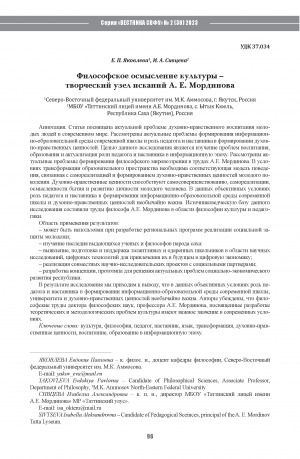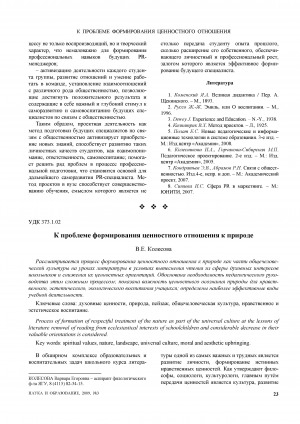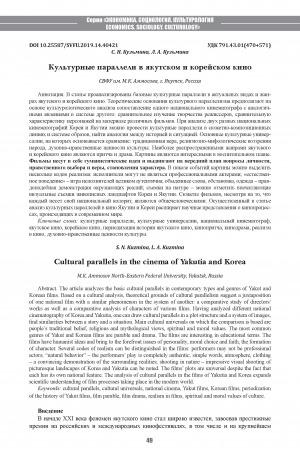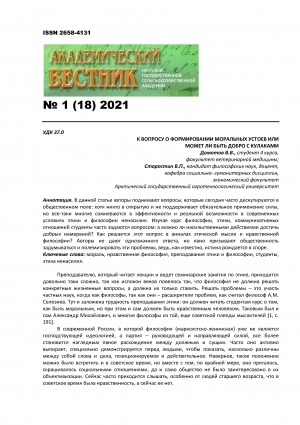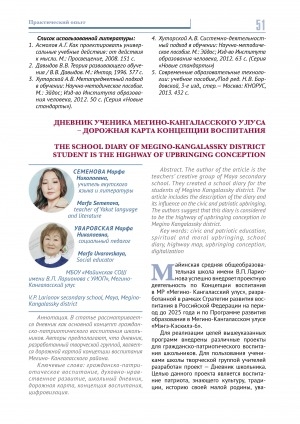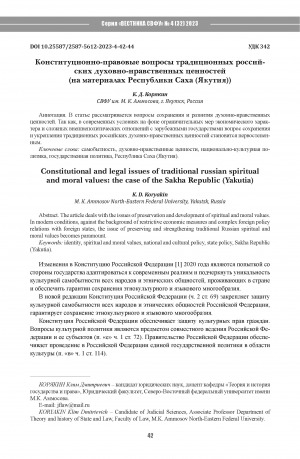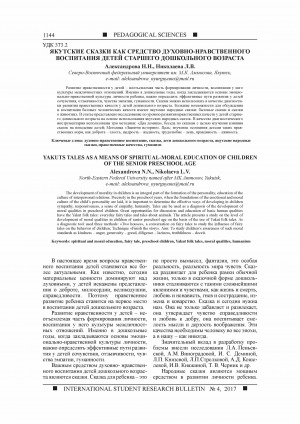Новая цифровая культура, перспективы развития образования в третьем тысячелетии, задачи гуманизации образования объективно выдвигают на первый план философское осмысление этнопедагогических методов воспитания в контексте развития региональной системы образования. В условиях трансформации ценностных установок в молодежной среде необходима соответствующая модель воспитания и образования молодых людей, связанная с творческим развитием и формированием целостной мировоззренческой культуры, нравственной устойчивости, патриотического духа. В современных условиях приоритетная задача заключается в том, чтобы выявить в развитии социально-философских исследований уникальные особенности традиционных этнопедагогических методов воспитания и образования. С точки зрения методики, это достигается, прежде всего, приобщением обучающихся к определенной системе этнокультурных ценностей, обычаев и традиций. В этой связи в статье представлены анализ и описание опыта работы летней школы для юношей "Мандар Уус кыһата". В течение многих лет летняя школа активно развивается и в настоящее время данный проект работает как этнокультурный центр, разработанный педагогами Баягинского наслега и Таттинского лицея им. А. Е. Мординова, на основе учения Бориса Федоровича Неустроева - Мандар Уус. В связи с этим проанализирована и охарактеризована система якутского образования "Уһуйуу", которая является интегральной моделью обучения и воспитания, опирающаяся на генеалогические методы исследования педагогических династий. Представленная модель продолжает традиции этнопедагогических методов воспитания, образования и направлена на сохранение, возрождение, распространение традиционных этнокультурных и духовно-нравственных ценностей в современном мире. Следует отметить важность выработки практических навыков, умений у обучающихся и необходимость непрерывного саморазвития и адаптации к изменяющимся условиям. Результаты исследования могут внести вклад в область социально-философских исследований, затрагивающих вопросы изучения основ педагогической культуры семьи в контексте развития региональной системы образования. Опыт и итоги работы могут быть использованы при разработке региональных программ реализации семейной политики и социальной поддержки молодежи.
The new digital culture, the prospects for the development of education in the third millennium, and the tasks of humanizing education objectively bring to the fore a philosophical understanding of ethnopedagogic methods of education in the context of the development of the regional education system. In the context of the transformation of value attitudes in the youth environment, an appropriate model of upbringing and education of young people is needed, associated with the creative development and formation of a holistic worldview culture, moral stability, and patriotic spirit. In modern conditions, the priority task is to identify the unique features of traditional ethnopedagogic methods of upbringing and education in the development of socio-philosophical research. From the point of view of methodology, this is achieved primarily by introducing students to a certain system of ethnocultural values, customs and traditions. In this regard, the article presents an analysis and description of the work experience of the Mandar Uus Kyhata summer school for young males. For many years, the summer school has been proactively developing, and currently this project works as an ethnocultural center developed by teachers of Bayaga community and A.E. Mordinov Tatta Lyceum, based on the teachings of Boris Neustroev - Mandar Uus. In this regard, the system of Yakut education “Uhuyu” is analyzed and characterized, which is an integral model of education and upbringing based on genealogical research methods of pedagogical dynasties. The presented model continues the traditions of ethnopedagogic methods of upbringing and education and is aimed at preserving, reviving, and spreading traditional ethnocultural and spiritual and moral values in the modern world. It emphasizes the importance of developing practical skills among students and the need for continuous self-development and adaptation to changing conditions. The results of the study can contribute to the field of socio-philosophical research that addresses the issues of studying the foundations of the pedagogical culture of the family in the context of the development of the regional education system. The experience and results of the work can be used in the development of regional programs for the implementation of family policy and social support for young people.


